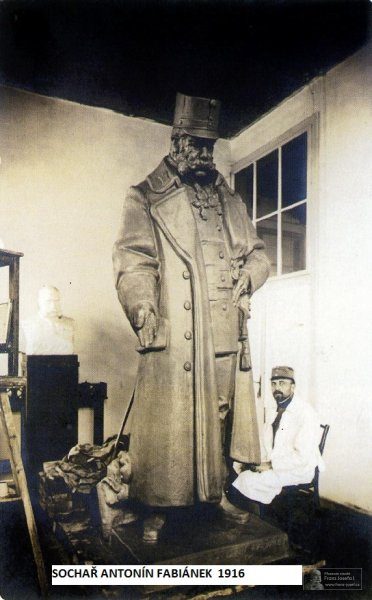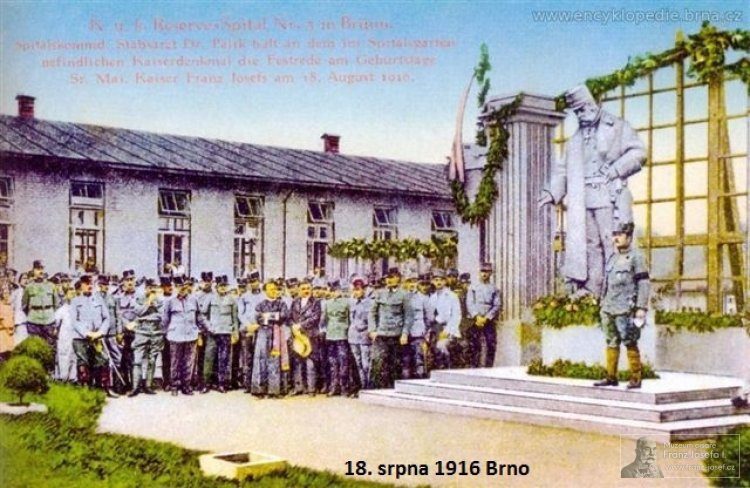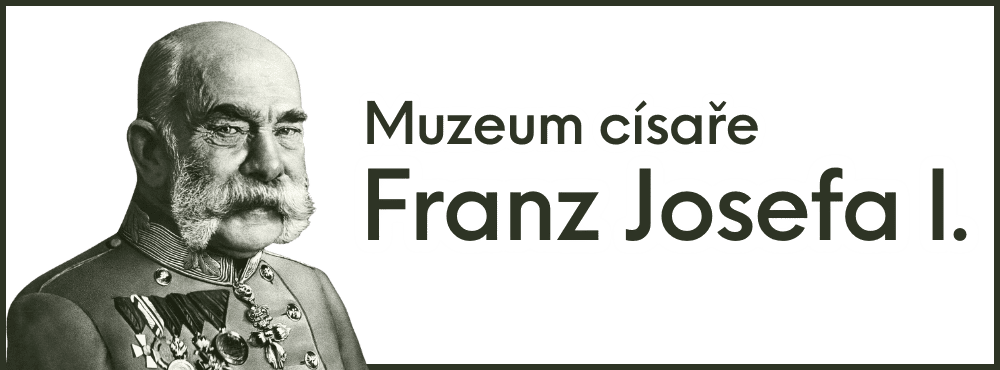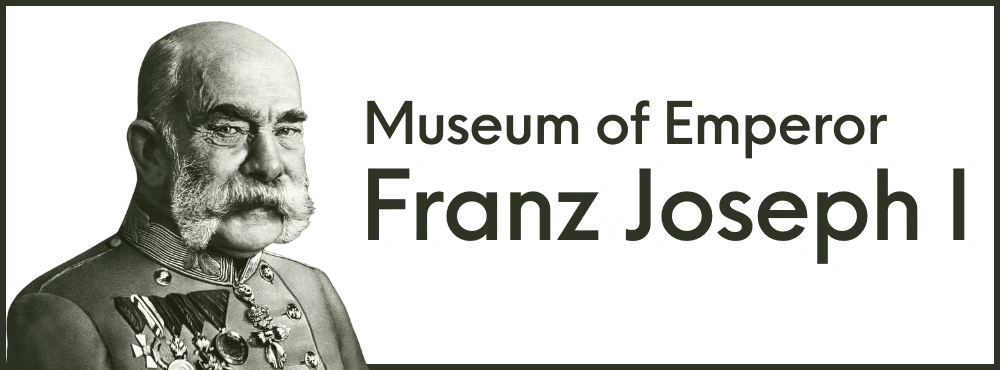Statue of FJI in the area of Barrack Hospital No. 3
Operation in wartime barracks hospital No. 3 was started on 26 April 1915. The hospital was located in the area of the military training ground between today's Tábor-Chodská-Jana Babák streets.
Po vypuknutí 1. světové války bylo nezbytně nutné připravit pro raněné vojáky provizorní nemocnice. V Brně byla největší z nich vybudována v přízemních, převážně dřevěných barácích postavených na vojenském cvičišti západně od jezdeckých kasáren. Měla kapacitu 2000 lůžek a jejím velitelem byl štábní lékař MUDr. Palik. Její oficiální název byl C. a k. záložní nemocnice č. 3 (K. u. k. Reserve-Spital Nr. 3 Brünn, Asperngasse) .
Source:
http://encyklopedie.brna.cz/home-mmb/?acc=profil_udalosti&load=3431
Slavnostní odhalení pomníku císaře Františka Josefa I. a vysvěcení kaple ve válečné barákové nemocnici se konalo 6.4.1916. Slavnost popisovaly Brněnské noviny v sobotu 8. dubna 1916 takto:
Daily news.
Unveiling of the monument to His Excellency the emperor in the war hospital in Brno. This morning in the war hospital in Ošpernská street, established and managed by the governorship, a monument to His Excellency was ceremonially unveiled. emperor and the newly built hospital chapel was consecrated. Already early in the morning His Exc. most likely bishop Rushing to the hospital and being welcomed by the director of the hospital, he went to the newly built chapel, which he blessed with the great assistance of the clergy. Meanwhile, well-read guests gathered near the ceremony site. Attended: Jich Exc. provincial governor Mr. Serényi, city commander field sub-marshal Hauninger, first deputy mayor Jelínek, associate member of the provincial committee msgre. Šrámek, numerous officers, senior state and provincial officials, representatives of medicine and numerous other personalities, as well as numerous wounded placed in the hospital with their doctors and nursing staff. Infantry Regiment No. 3 formed an honor centurion with music. A few minutes before 10 o'clock in the morning His Exc. Baron Heinold, Deputy Governor, and received the report of the Hospital Director, Chief District Physician, Dr. Krejčí. After that, the participants of the ceremony left in front of the still veiled monument, where the Most Rev. Bishop Huvna with the clergy. Here the governor welcomed those who came, thanked the bishop for consecrating the chapel and said, among other things: All the nations of the wide empire are represented here and thus give an image of a great, common homeland, which, fulfilling its historical mission, united nations and countries. It is composed in different ways, there were often differences in the particulars of the effort, but they all rose with one accord to protect the empire when he called who unites on his noble head the crown of Austria and the holy crown of Hungary, to whom all national powers look with equal respect. His Majesty, our most gracious Emperor.
At the end of his speech, the governor signaled for the unveiling of the monument and invited those present to shout: His Highness the Apostolic Majesty, our most gracious emperor - Er lebe hoch! Elen! Glory! Long live! The veil fell to the shouts of those present in all the speeches and to the sublime sounds of the Austrian anthem. For this, the governor especially thanked the creator of the beautifully successful monument, the academic sculptor Fabiánek, First Lieutenant Schwarz, who initiated the establishment of the monument and contributed a larger donation to cover the costs, as well as the builder Müller, who supplied the building material free of charge, and other gentlemen who earned merit about the organization of the celebration. In the ceremonial procession, the participants then went to the newly built chapel, which was built according to the plans of the governor's construction department and artistically decorated by the academic painter Köhler, where the bishop dr. Mr. After an enthusiastic speech, Huvna celebrated St. mass. The uplifting celebration ended with the parade of the honorary hundred in front of the assembled guests.
To strengthen the fighting spirit of the soldiers, the officers and the Brno honors of the day participated On August 18, 1916, in the open space between the barracks, a birthday celebration of Emperor Francis Joseph I was held in front of his larger-than-life statue by the sculptor Antonín Fabiánek. The ceremonial speech was given by the staff physician MUDr. A stick. Even this grand gesture celebrating the old ruler's birthday, combined with massive war propaganda, did not win the war for Austria. After all, the faces of the then "Landvéraks" and war invalids in the preserved photographs reveal anything other than fanatical enthusiasm or a desire to serve until the body is torn apart (in the case of citizens of Czech nationality, of course, this was doubly true). They probably preferred walking along carefully maintained paths (strict military discipline applied here as well) and basking in the sun, knowing that of all the war camps that have been through, the city of Brno is far from the worst... .
Source:
Jiří Skoupý, Silent Men www.hvezdarna.cz/kravihora




